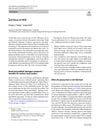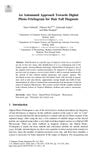 December 2023 in “bioRxiv (Cold Spring Harbor Laboratory)”
December 2023 in “bioRxiv (Cold Spring Harbor Laboratory)” AP-2α and AP-2β proteins are essential for healthy adult skin and hair.
 November 2023 in “Food science of animal resources”
November 2023 in “Food science of animal resources” Lactilactobacillus curvatus LB-P9 taken orally helps hair regrow faster and thicker in mice.
 October 2023 in “bioRxiv (Cold Spring Harbor Laboratory)”
October 2023 in “bioRxiv (Cold Spring Harbor Laboratory)” Immune cells are essential for early hair and skin development and healing.
 September 2023 in “International journal of Unani and integrative medicine”
September 2023 in “International journal of Unani and integrative medicine” Hair loss patterns are linked to temperament and can help diagnose it.

Non-invasive methods can effectively diagnose and manage alopecia areata.

A new system for classifying curly hair types using precise measurements can improve hair care products and cultural inclusion.
 February 2023 in “Sibirskij onkologičeskij žurnal”
February 2023 in “Sibirskij onkologičeskij žurnal” Chemotherapy often causes hair loss in cancer patients, affecting their mental health, but scalp cooling can help prevent it.
 January 2023 in “International Journal of Research Publication and Reviews”
January 2023 in “International Journal of Research Publication and Reviews” Some herbal ingredients like linalool and tea tree oil have anti-dandruff properties and are safe for use in shampoos.
 December 2022 in “Deleted Journal”
December 2022 in “Deleted Journal” Sheep wool keratin solution safely and effectively promotes hair growth.

No single biomarker is reliable enough for diagnosing and assessing SLE.
 November 2021 in “Journal of pharmaceutical research international”
November 2021 in “Journal of pharmaceutical research international” Herbal depilatories are safer and cause fewer side effects than chemical ones for hair removal.

Researchers found a genetic link for hereditary hair loss but need more analysis to identify the exact gene.
 May 2021 in “Histochemistry and Cell Biology”
May 2021 in “Histochemistry and Cell Biology” The May issue discussed publishing agreements and four studies on cholesterol in hair, cancer cell changes, hormones in the uterus, and skin protein effects.
 April 2021 in “Arab Journal of Nuclear Sciences and Applications/Arab Journal of Nuclear Sciences and Applications ”
April 2021 in “Arab Journal of Nuclear Sciences and Applications/Arab Journal of Nuclear Sciences and Applications ” Repeated use of protein hair conditioner with heat or gamma irradiation can harm skin and hair health in rats.
 March 2021 in “bioRxiv (Cold Spring Harbor Laboratory)”
March 2021 in “bioRxiv (Cold Spring Harbor Laboratory)” Removing a specific gene in certain skin cells causes hair loss on the body by disrupting normal hair development.
 March 2021 in “Research Square (Research Square)”
March 2021 in “Research Square (Research Square)” The SbbHLH85 protein helps sweet sorghum grow more root hairs but makes the plant more sensitive to salt.
 January 2021 in “bioRxiv (Cold Spring Harbor Laboratory)”
January 2021 in “bioRxiv (Cold Spring Harbor Laboratory)” Mothers have more hair proteins than their children, with age-related differences in protein patterns, and some proteins in hair could indicate early childhood development.

Human hair keratins can self-assemble and support cell growth, useful for biomedical applications.
 November 2019 in “Harper's Textbook of Pediatric Dermatology”
November 2019 in “Harper's Textbook of Pediatric Dermatology” Understanding normal hair growth and loss in children is key to diagnosing and treating hair disorders.
 February 2019 in “bioRxiv (Cold Spring Harbor Laboratory)”
February 2019 in “bioRxiv (Cold Spring Harbor Laboratory)” The gene Prss53 affects hair shape and bone development in rabbits.
 December 2018 in “IntechOpen eBooks”
December 2018 in “IntechOpen eBooks” Neurohormones help control skin health and could treat skin disorders.
 April 2018 in “bioRxiv (Cold Spring Harbor Laboratory)”
April 2018 in “bioRxiv (Cold Spring Harbor Laboratory)” A gene variant causes patched hair loss in mice, similar to alopecia areata in humans.
 January 2018 in “Communications in computer and information science”
January 2018 in “Communications in computer and information science” Researchers developed a computer system to automatically diagnose hair loss by analyzing scalp images.
 May 2017 in “InTech eBooks”
May 2017 in “InTech eBooks” Trichoscopy and trichogram are useful for diagnosing hair and scalp conditions.
 July 2016 in “American Journal of Dermatopathology”
July 2016 in “American Journal of Dermatopathology” The meeting showcased rare skin disease cases, highlighting the need for accurate diagnosis and treatment.

Forensic hair analysis for drugs is now more reliable and accurate.

Modern hair restoration techniques can effectively treat hair loss and provide natural-looking results.
 April 2014 in “Journal of evolution of medical and dental sciences”
April 2014 in “Journal of evolution of medical and dental sciences” Women over forty can maintain skin and hair health with lifestyle and dietary changes.
 January 2014 in “Journal of Pigmentary Disorders”
January 2014 in “Journal of Pigmentary Disorders” Women's hair gets thinner and grayer as they age, with treatments available for hair loss and graying.

Keratin hydrogels from human hair show promise for tissue engineering and regenerative medicine.






























